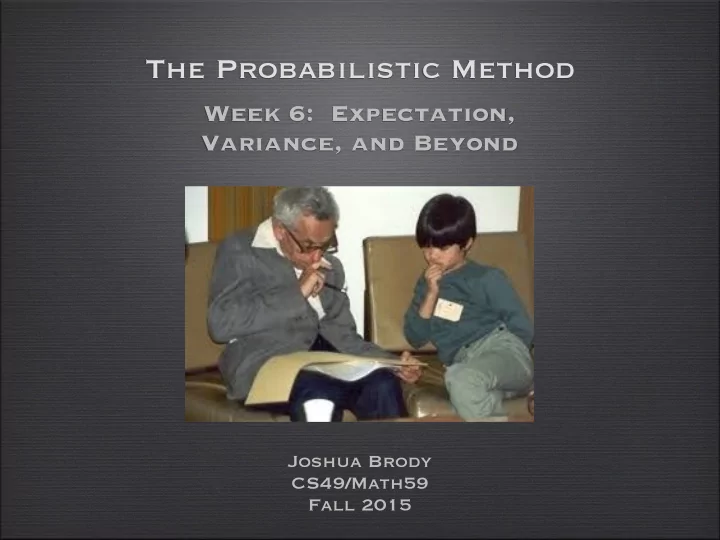

The Probabilistic Method Week 6: Expectation, Variance, and Beyond Joshua Brody CS49/Math59 Fall 2015
Reading Quiz What is the law of large numbers? (A) For any large number, there is always a larger number. (B) As n gets large, the sample mean of n identically distributed random variables closely approximates the expected value with high probability. (C) As n gets large, the expected value of the sum of n variables approaches the sum of the expected value of n variables. (D) Pr[X ≥α ] ≤ E[X]/ α (E) None of the above
Reading Quiz What is the law of large numbers? (A) For any large number, there is always a larger number. (B) As n gets large, the sample mean of n identically distributed random variables closely approximates the expected value with high probability. (C) As n gets large, the expected value of the sum of n variables approaches the sum of the expected value of n variables. (D) Pr[X ≥α ] ≤ E[X]/ α (E) None of the above
Expectation and Variance • E[X] = ∑ w X(w) P(w) • Var[X] := E[(X-E[X]) 2 ] Markov’s Inequality: Pr[X ≥ α ] ≤ E[X]/ α
Clicker Question There are 300k workers in Delaware County. • average income: 40k • variance: 100 million (10k) 2 How many can make $100k ? (A) at most 120k workers (B) at most 88k workers (C) at most 12k workers (D) at most 8333 workers (E) none of the above
Clicker Question There are 300k workers in Delaware County. • average income: 40k • variance: 100 million (10k) 2 How many can make $100k ? (A) at most 120k workers (B) at most 88k workers (C) at most 12k workers (D) at most 8333 workers (E) none of the above
Markov/Chebyshev Inequalities There are 300k workers in Delaware County. • average income: 40k • variance: 100 million (10k) 2 How many can make $100k ? max % of workers max # of workers ≤ 40% ≤ 120,000 Markov ≤ 29% ≤ 88,235 Markov + min wage ≤ 3% ≤ 8,333 Chebyshev
Clicker Question X 1 , ..., X n : fair coins, X = ∑ i X i What is Pr[X ≥ n/2 + c √ n] ? (A) at most exp(-cn) (B) at most exp(-c 2 n) (C) at most exp(-c 2 ) (D) at most exp(-c 2 n 2 ) (E) none of the above
Clicker Question X 1 , ..., X n : fair coins, X = ∑ i X i What is Pr[X ≥ n/2 + c √ n] ? (A) at most exp(-cn) (B) at most exp(-c 2 n) (C) at most exp(-c 2 ) (D) at most exp(-c 2 n 2 ) (E) none of the above
Error Reduction in Randomized Algorithms Given randomized algorithm A: • answers YES or NO is input prime number? • does graph have a large clique? • is this a picture of a cat? • • runs in T steps • answers correctly with probability 2/3
Error Reduction in Randomized Algorithms Given randomized algorithm A: • answers YES or NO is input prime number? • does graph have a large clique? • is this a picture of a cat? • • runs in T steps • answers correctly with probability 2/3 Problem: Give efficient algorithm A’ that answers correctly with probability > 99% .
The Probabilistic Method
Recommend
More recommend